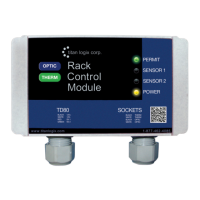TD80™ Level Gauging and Overfill Prevention System Product Manual
Rev. 2, August 4, 2015/ TD80 Programming Page 131
i. Select several positions along the probe to confirm volume programming.
The finch display shows correct volume and units for positions such as
¼, ½ and ¾ full compartment levels on the probe.
c. HH alarm activates when the level reaches the HH alarm setting.
i. Display shows blinking “HH” and volume
d. HH alarm deactivates when Up-Up-Down-Up button combination is pressed.
i. Display returns to normal, not blinking
e. Spill alarm activates when the level reaches the Spill alarm setting.
i. Display shows flashing “SPill”
f. Spill alarm deactivates when the level decreases more than 2” below the Spill
alarm setting.
i. Display returns to normal, not flashing “SPill”
8. Test the 4-20mA output (if installed) by doing the following:
a. Monitor the 4-20mA signal with a digital Multimeter (DMM).
b. Short the probe with a finger or small metal rod at several points along the length
of the probe.
c. No short across the probe produces a signal of 4mA or slightly greater.
Increasing level of the short produces an increasing current toward 20mA.
6.3.3 TD80 Birdfeeder 2 Detailed Programming Instructions
Requirements
1. TD80 transmitter
2. 12-24VDC power supply, battery or AC adapter
3. SV Bus to RS232 Converter (SV converter)
4. Birdfeeder 2 software
5. PC with Windows XP or above with a serial port or USB to serial adapter
6. Strapping table (calibration chart) for the compartment including required and optional
settings such as:
a. Probe type
b. Spill and HH levels
c. Volume units and number of decimal places to display
d. Spill alarm clearing option
e. Riser height
f. Sump depth
g. 4mA and 20mA output offsets
Wiring Connections
Using the original SV-RS232 Converter
1. Ensure that the power supply or battery voltage is turned off. Unplug the AC power
adapter from the outlet if it is being used for programming.
2. Verify that the area is free of explosive fumes
3. Plug the AC power adapter into the SV converter OR
Ensure that the battery is well charged, measures at least 8VDC and attach the following
wires:
a. Power supply or battery positive to SV converter White wire
b. Power supply or battery negative to SV converter bare Shield wire
4. Connect the TD80 as follows:
a. SV converter White wire to TD80 Gauge Power
b. SV converter bare Shield wire to TD80 Gauge Ground
c. SV converter Black wire to TD80 SV Bus

